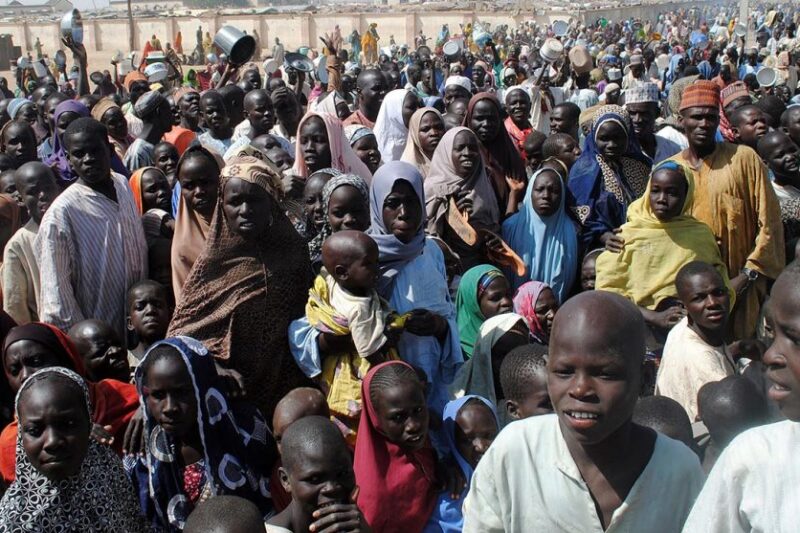“If we don’t get help soon, displaced people – especially children and the elderly – are going to die from starvation.”
So said internally displaced persons (IDPs), originally from Gwoza in Borno State, who fled to Adamawa State after their hometowns were attacked by insurgents.
Now they are pleading with the Adamawa State government and non-governmental organisations (NGOs) for aid. They are taking refuge in informal community camps in the Koffare and Jebbe wards of the Yola North Local Government Area in the state.
The informal community camps house more than 1,000 IDPs.
Aisha Ali, a displaced woman at Koffare, told RNI that she fled from Gwoza after all the houses and their possessions were destroyed and burnt down by members of the Jamā’at Ahl as-Sunnah lid-Da’way Wa’l-Jihād (JAS), more commonly referred to as Boko Haram.
“We fled our village in Gwoza and went to Adamawa State. We have been staying in Koffare for many years, even though life is very tough here. We sometimes receive support from members of the host community and some local NGOs but it is not enough to sustain us. Sometimes, we have to beg people to get something to eat. And sometimes we go to people’s farms to get firewood to cook whatever food we have.
“Our main challenge in this camp is not having enough food. Every day it is a struggle to get something to eat for our children and ourselves. We sometimes go for days without eating anything. We are starving. It makes us feel so weak that we don’t have the energy to go looking for food. And it also affects our children’s health and especially the wellbeing of the elderly.”
Aisha Ali said she and other IDPs were pleading with the government and humanitarian agencies to intervene.
“We desperately need food. We will die if we don’t get food. We also need financial support to help us to start a business so that we can become self-reliant. We need to find something that is sustainable. It is terrible to have to beg people for food every day.”
Nana Kaltum Hamidu told RNI that the Red Cross used to provide food.
“But now the NGO no longer gives us food and every day it is a struggle to feed ourselves – it’s been like this since we fled from Gwoza. Although we are all starving, it is our children who suffer. And the elderly really feel the pain. They are hungry and they have no money to buy food.
“We are now taking refuge at this informal community camp in the Jebbe ward. Apart from food, our children are not getting an education because there are no schools and we also do not have any healthcare services because there is no clinic or healthcare facility inside the camp.
“Every single day we struggle to survive. Sometimes our children do some work with people in the charcoal selling business and then they give us the money they make and help us to put food on the table.”
Hamidu said there were not enough shelters in the camp and some of the IDPs rented a room in the host community.
“The trouble is that the room is too small to provide space for six to 10 to sleep.
“I’m begging both humanitarian aid providers and the government to come to help us. If we don’t get aid soon, hunger will kill us and our children.”
Aji Ali, also originally from Gwoza, told RNI that it was hard to live in the Koffare informal community camp.
“We do not have potable water, we are hungry all the time, there are no healthcare services and no school for the children in the camp. Our children need an education. Without it, they will end up like us. They won’t get work and they will carry on living this way – and this is no way for anyone to live. It’s imperative that they get an education.”
He said there were more than 1,000 displaced persons living in the camps. Most of them had come from the Gwoza Local Government Area and some from Madagali town in Adamawa State.
“We are appealing to the government and NGOs to come to our aid. We need food, potable water, shelters, a healthcare facility and a school for our children. If we don’t get aid soon, we are probably going to starve to death.”
SHETTIMA LAWAN MONGUNO









